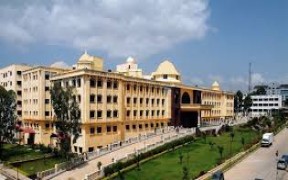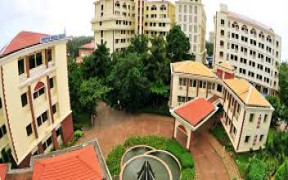BSc NeuroScience Colleges in Bangalore: Top Colleges, Admission Process, Exams, Placements, and Career Opportunities
BSc NeuroScience is an emerging undergraduate degree that focuses on the scientific study of the brain and nervous system. NeuroScience is a rapidly growing field in the medical sciences, offering vast career opportunities in research, healthcare, and clinical settings. With the rise in neurological disorders and mental health challenges globally, the demand for NeuroScience professionals is increasing. Bangalore, being a hub for medical education and healthcare services, offers several opportunities for students pursuing a BSc in NeuroScience. This guide explores the details of BSc NeuroScience, top BSc NeuroScience colleges in Bangalore, admission procedures, career prospects, and more.
List of Top BSc NeuroScience Colleges in Bangalore
Bangalore is home to several reputed colleges offering BSc NeuroScience, where students can receive high-quality education and hands-on training. Some of the top BSc NeuroScience colleges in Bangalore:
Top BSc Allied Health Science Courses in Bangalore
What is BSc NeuroScience?
BSc NeuroScience is a specialized undergraduate program that delves into the biology of the nervous system. The course covers a wide range of subjects, including neuroanatomy, neurophysiology, neurochemistry, brain function, and the molecular biology of neurons. The objective of the program is to help students understand the structure and function of the brain and nervous system, along with the study of diseases and disorders related to these systems.
Key components of the BSc NeuroScience curriculum include:
- Neuroanatomy: Study of the structure of the nervous system, including the brain, spinal cord, and peripheral nerves.
- Neurochemistry: Understanding the chemical processes that occur in the nervous system, including neurotransmitter activity.
- Neurophysiology: Learning about the functioning of neurons, synapses, and brain circuits.
- Cognitive Neuroscience: The relationship between the brain and cognitive functions such as memory, learning, and decision-making.
- Neurological Disorders: Exploring diseases like Alzheimer's, Parkinson's, epilepsy, and multiple sclerosis.
- Research Methods: Training students in laboratory techniques, research methodologies, and data analysis related to neurobiology.
By the end of the program, graduates are equipped with a deep understanding of brain functions, neurological diseases, and research methodologies, preparing them for a variety of career opportunities in research, clinical settings, and more.
BSc NeuroScience Admission Procedure in Bangalore
The admission process for BSc NeuroScience in Bangalore typically involves the following steps:
Eligibility Criteria for BSc NeuroScience in Bangalore
- Educational Qualifications: Students must have completed their 12th grade with a background in science (Physics, Chemistry, and Biology) from a recognized board. A minimum aggregate of 50% in these subjects is usually required (may vary by college).
- Entrance Exam: Some colleges may require students to take an entrance exam for admission to the BSc NeuroScience program. These exams usually test knowledge of biology, chemistry, and basic physics.
- Merit-Based Admission: Several colleges in Bangalore admit students based on their performance in the 12th grade, particularly if the college does not conduct an entrance test.
Application Process for BSc NeuroScience in Bangalore
-
Online Application: Students must fill out the online application form on the college's official website. Ensure that all required details are accurately entered, and necessary documents (such as marksheets, identity proof, and photographs) are uploaded.
-
Entrance Exam (if applicable): For colleges that conduct entrance exams, students must register and take the exam. This may include written tests, online assessments, or interviews.
-
Counseling and Interview: Shortlisted candidates will be called for counseling or interviews, where they will be evaluated based on academic performance and interest in the field of neuro-science.
-
Fee Payment: Upon selection, candidates must pay the course fee to secure their admission.
Direct Admission for BSc NeuroScience Colleges in Bangalore
Several private colleges in Bangalore offer direct admission to the BSc NeuroScience program, especially those with a strong reputation in the medical sciences. The process for direct admission usually involves:
Steps for Direct Admission
-
Check Eligibility: Ensure that you meet the basic eligibility criteria, such as having completed your 12th-grade education in the science stream.
-
Visit the College: Direct admission often requires students to visit the college to fill out the application form and submit relevant documents.
-
Payment of Fees: After verification of eligibility, the student must pay the course fee to confirm their admission.
Direct admission is generally available on a first-come, first-serve basis, depending on seat availability. However, it is important to verify the credibility of the college and ensure that it is recognized by the appropriate educational bodies.
Placements After BSc NeuroScience in Bangalore
Graduates of BSc NeuroScience from reputed institutions in Bangalore can expect excellent job prospects due to the growing demand for neuro-scientific research and healthcare professionals. Some of the common career paths for BSc NeuroScience graduates include:
Job Roles
- NeuroScience Researcher: Conducting research on various aspects of the nervous system, including brain function, neural circuits, and neurodegenerative diseases.
- Neurotechnologist: Working with advanced equipment to diagnose neurological disorders and assist in treatment plans.
- Clinical Neurophysiologist: Performing tests such as EEG (electroencephalogram) and EMG (electromyography) to assess brain and nerve function.
- Neurotherapist: Helping patients with neurological conditions manage their symptoms and improve their quality of life.
- Neurology Lab Technician: Working in medical laboratories specializing in neurological testing and diagnostics.
- Academic/Research Assistant: Assisting in neuro-science labs or academic research settings.
Top Employers
- Hospitals and Clinics: Leading healthcare institutions in Bangalore like Narayana Health, Manipal Hospital, and Fortis Healthcare regularly hire BSc NeuroScience graduates for various roles.
- Research Institutes: Organizations like Indian Institute of Science (IISc) and National Brain Research Centre offer research opportunities for graduates.
- Pharmaceutical Companies: Companies involved in developing neuropharmaceuticals, such as Cipla, Dr. Reddy’s Laboratories, and Biocon, hire neuro-science professionals for research and clinical trials.
- Academic Institutions: Many graduates also choose to pursue higher studies or work as academic assistants in colleges and universities.
Graduates of BSc NeuroScience can expect competitive salaries, with entry-level salaries typically ranging from INR 3,00,000 to INR 5,00,000 annually. With experience and specialization, salaries can go up significantly.
Why Study BSc NeuroScience in Bangalore?
Bangalore offers numerous advantages for students pursuing BSc NeuroScience, including:
- World-Class Education: The city is home to some of India’s top universities and medical colleges, providing access to excellent faculty and cutting-edge research opportunities.
- Medical Hub: As a major healthcare hub in India, Bangalore has a thriving medical infrastructure, offering students exposure to top hospitals and healthcare facilities.
- Research Opportunities: Students can engage in groundbreaking research in neuro-science through collaborations with renowned institutes like IISc and NIMHANS.
- Career Prospects: With the increasing focus on neuro-science, mental health, and neurological disorders, Bangalore provides a wealth of job opportunities for graduates.
- Networking: The city hosts several national and international conferences and workshops in the field of neuro-science, providing students opportunities to network with industry professionals and experts.
BSc NeuroScience Fee in Bangalore
The fee structure for BSc NeuroScience in Bangalore varies based on the institution and its infrastructure. On average, the annual course fee ranges between INR 50,000 and INR 2,00,000. Government colleges usually have lower fees, while private institutions charge higher fees. Students should also consider additional costs for laboratory work, research materials, and other incidental expenses.
Conclusion
BSc NeuroScience is a rewarding program that opens up a wide range of career opportunities in healthcare, research, and clinical settings. Bangalore, with its renowned educational institutions, world-class healthcare facilities, and vibrant research environment, offers an ideal setting for pursuing this degree. By choosing to study BSc NeuroScience in Bangalore, students gain access to excellent academic training, career prospects, and the chance to contribute meaningfully to the understanding and treatment of neurological disorders. Whether you aim to become a clinical neurophysiologist, a neuro-scientific researcher, or a therapist, this program equips you with the skills and knowledge to excel in the dynamic and evolving field of NeuroScience.
FAQ's for BSc NeuroScience Colleges in Bangalore
The BSc Neuroscience program explores the structure, function, and development of the brain and nervous system. It provides students with a thorough understanding of how neural processes affect behavior, cognition, and health. The course blends theoretical knowledge with laboratory-based practical experiences to prepare students for careers in neuroscience research or clinical settings.
Graduates of the BSc Neuroscience program can pursue careers in academic research, clinical trials, pharmacology, healthcare, or biotechnology. Some also work as neuropsychologists, lab technicians, or data analysts. Additionally, the program can serve as a stepping stone for postgraduate studies in neuroscience, psychology, or medicine.
A background in biology is highly beneficial when applying for the BSc Neuroscience program. Knowledge in biology, particularly human biology, anatomy, and physiology, provides a strong foundation for understanding the concepts related to neural structures and processes that are explored throughout the program.
Neuroimaging plays a crucial role in the BSc Neuroscience program. Students are introduced to various neuroimaging techniques, such as MRI, PET scans, and EEG, to study brain activity and structure. These tools are essential for understanding neurological disorders and conducting research in brain function.
Yes, the BSc Neuroscience program is suitable for students interested in clinical careers. It offers a strong foundation in understanding brain function and disorders, providing a stepping stone for students who want to pursue careers as neuropsychologists, neurologists, or other healthcare professionals specializing in the nervous system.
Neuroscience and psychology are related but distinct fields. While psychology focuses on understanding behavior, emotions, and mental processes, neuroscience, as explored in the BSc Neuroscience program, focuses on the biological and physiological mechanisms behind brain functions and behavior. Both fields complement each other, with neuroscience offering insights into the underlying brain activity.
Laboratory work is an essential part of the BSc Neuroscience program. Students have the opportunity to work in well-equipped labs where they can conduct experiments, analyze neural data, use advanced neuroimaging tools, and gain practical experience in experimental neuroscience research.
Neuroplasticity, the brain's ability to reorganize and adapt, is an important topic covered in the BSc Neuroscience program. Students learn how the brain forms new neural connections in response to injury or experience, and how this understanding is used in rehabilitation and neurotherapy.
In the BSc Neuroscience program, students are introduced to a variety of brain study methods, including neuroimaging techniques like MRI, PET scans, and EEG, as well as behavioral experiments and electrophysiology. These methods are essential for understanding brain function and studying neurological diseases.
Students in the BSc Neuroscience program are assessed through a combination of exams, practical assessments, research projects, and presentations. These assessments allow students to demonstrate their understanding of the brain and nervous system, as well as their ability to apply scientific principles.
To pursue BSc NeuroScience, students must have completed 10+2 with a strong background in science, including subjects like Biology, Chemistry, and Physics. A minimum of 50% aggregate is generally required by most universities.
The BSc NeuroScience program typically spans three years, divided into six semesters. It includes theoretical studies, practical training, and research projects focused on the nervous system.
After completing BSc NeuroScience, you can pursue MSc in NeuroScience, MSc in Clinical Neuropsychology, or other specialized postgraduate programs for advanced research and career prospects.
In India, the scope of BSc NeuroScience is growing with the increasing demand for neurotechnologists and researchers in healthcare, diagnostics, and academic sectors.
Internships during BSc NeuroScience typically involve working in neuroscience labs, hospitals, or research centers, focusing on experiments, data analysis, and understanding neurological disorders.
To excel in BSc NeuroScience, students need analytical thinking, problem-solving abilities, attention to detail, and an aptitude for research and experimentation.
Yes, BSc NeuroScience is the first step toward becoming a neuroscientist. You will need to pursue postgraduate studies and possibly a PhD to specialize further in the field.
Unlike general biology courses, BSc NeuroScience focuses on the nervous system, studying brain functions, neurological disorders, and cognitive processes in depth.
Job roles for BSc NeuroScience graduates include neurotechnologist, research assistant, cognitive scientist, and lab technician in healthcare or research institutions.
BSc NeuroScience provides insights into mental health by studying the neural basis of psychological disorders, enabling advancements in treatments and therapies.
Enquire Now
Top 10 BSc NeuroScience Colleges in Bangalore
- East Point Group of Institutions Bangalore
- Akash Group of Institutions Bangalore
- Vydehi Institute of Medical Sciences and Research Centre Bangalore
- Srinivas University Mangalore
- Sree Siddhartha Medical College and Research Centre Tumkur
- MVM Group of Institutions Bangalore
- Yenepoya University Mangalore
- Yenepoya School of Allied Health Science Mangalore
- Father Muller College of Allied Health Sciences Mangalore
- A.J. Institute of Medical Sciences and Research Centre Mangalore
Top Courses

List of Best 10 Colleges in Bangalore
- Christ University Bangalore
- RV College of Engineering Bangalore
- MS Ramaiah Institute of Technology Bangalore
- St Josephs University Bangalore
- Jain University Bangalore
- Kristu Jayanti College Bangalore
- Mount Carmel College Bangalore
- IFIM School of Management Bangalore
- PES University Bangalore
- Presidency University Bangalore











